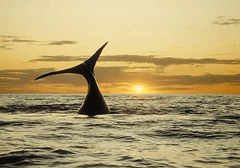Whale Songs
Air Date: Week of March 7, 2008

A Southern Right Whale uses its fluke in the wind as a sail, an activity understood to be whale play. (Photo: Iain Kerr)
Living on Earth visits Dr. Roger Payne and Iain Kerr, whale researchers with the organization Ocean Alliance, aboard their ship “Odyssey.” In the second installment of the story, Dr. Payne talks about his whale song research and says that whale tunes have changed over the years.
Transcript
[WHALE SONG]
CURWOOD: We recently reported on the Ocean Alliance research vessel Odyssey, which travels the world to collect blubber samples from whales. The Odyssey also collects recordings of whales singing, continuing the work that Roger Payne, president of Ocean Alliance, started more than 40 years ago.
[WHALE SONG]
CURWOOD: And Dr. Payne says he’s noticed that, over the years, the whales have changed their tunes.
PAYNE: The sounds of this particular one were recorded in about 1961. They are more beautiful I think than any sounds that have been made since.
[WHALE SONG]
These animals change their songs so that after five years you have a totally different song from what you had before. And that means that as time goes by the song drifts into new territory. What it’s in now is, it’s alright, it’s interesting, and it’s quite lovely, but it’s not this same keening extraordinary cries that just fill your heart as well as the air.
[WHALE SONG]
This is about ten years later, and it is also in exactly the same place, the same species, but now nothing like this was present in the ones that you heard just a moment ago.
[WHALE SONG]
The whales slowly accumulated a bunch of differences until they began to sing this song.
[WHALE SONG]
I think what probably happens is somebody invents a new phrase in the song and if it is popular with females – because I suspect, although I can’t prove that that is its principal function – then what it would do is, other males would observe, oh my gosh he’s doing better than I am, and they would go off and copy the same thing to gain the same advantage.

Roger Payne says not only do whale songs feature musical phrases, rhymes, and yodeling, they also change over time. (Photo: Iain Kerr)
[MUSIC AND WHALE SONG]
They mix about the same degree of percussive noisy sounds with melodic pure tones. They also do strange things like doing A-B-A form, where they make a statement, a musical statement, then they shift to another one, then they return to the first one.
[WHALE SONG]
Now that’s one phrase, and the whale repeats its phrase and sort of yodels the second time. Here, I’ll show what I mean.
[WHALE SONG]
Now if we had time, we would listen to that whale do many many iterations of that one theme, and then eventually it would change what it was doing and make something completely different, and it would do that for a while, oh, and then it would change again, and do a third and a fourth and a fifth, up to nine times in some songs. So it’s an interesting – it takes a long time to hear a whale song.
[WHALE SONG]
You can’t rush a whale. They also use rhyme in their songs. That is the same trick that the old troubadours used to do in order to remember epic poems, is they included rhyme. It’s a mnemonic device, a thing that allows you to remember what comes next.

A Southern Right Whale uses its fluke in the wind as a sail, an activity understood to be whale play. (Photo: Iain Kerr)
And now the question to me is, why, how possibly is this the case? There’s not a chance that whales were aware of humans or humans were aware of whales. And yet they are using the same tricks. My suspicion is, is that the vertebrate brain, whether it’s located in the head of a whale or the head of a human being, is entertained by pretty much the same kinds of things.
[WHALE SONG]
To me that suggests the following: that music is probably older than our species, a lot older than our species. That basically there was a common ancestor to humans and whales at least when it comes to music, and that these laws got passed through a whole chain of species in both cases and finally have ended up in us, and that these use the same sorts of tricks to gain whatever their final gain is. My suspicion is to the attraction of a female.
[WHALE SONG]
CURWOOD: Roger Payne, expert interpreter and collector of whale songs, and President of the Ocean Alliance. Our story was produced by Bobby Bascomb and Bruce Gellerman.
[WHALE SONG; All Whale song samples were provided by Dr. Roger Payne]
Links
Living on Earth wants to hear from you!
Living on Earth
62 Calef Highway, Suite 212
Lee, NH 03861
Telephone: 617-287-4121
E-mail: comments@loe.org
Newsletter [Click here]
Donate to Living on Earth!
Living on Earth is an independent media program and relies entirely on contributions from listeners and institutions supporting public service. Please donate now to preserve an independent environmental voice.
NewsletterLiving on Earth offers a weekly delivery of the show's rundown to your mailbox. Sign up for our newsletter today!
 Sailors For The Sea: Be the change you want to sea.
Sailors For The Sea: Be the change you want to sea.
 The Grantham Foundation for the Protection of the Environment: Committed to protecting and improving the health of the global environment.
The Grantham Foundation for the Protection of the Environment: Committed to protecting and improving the health of the global environment.
 Contribute to Living on Earth and receive, as our gift to you, an archival print of one of Mark Seth Lender's extraordinary wildlife photographs. Follow the link to see Mark's current collection of photographs.
Contribute to Living on Earth and receive, as our gift to you, an archival print of one of Mark Seth Lender's extraordinary wildlife photographs. Follow the link to see Mark's current collection of photographs.
 Buy a signed copy of Mark Seth Lender's book Smeagull the Seagull & support Living on Earth
Buy a signed copy of Mark Seth Lender's book Smeagull the Seagull & support Living on Earth

